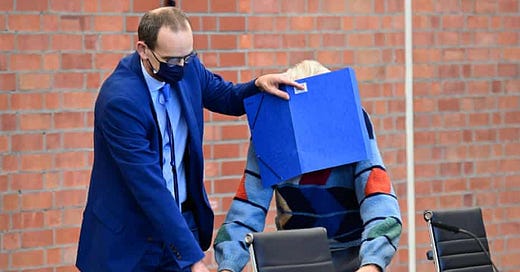WHILE many eyes this week have been trained on the twenty-year sentence given to the 60-year-old Ghislaine Maxwell in a court in the United States, relatively few have noticed the five-year sentence given to the 101-year-old Josef Schütz in a court in Germany. While Maxwell was convicted largely of sex trafficking, the crimes of Schütz were far worse, for he was found guilty of being an accessory to the murders of 3,518 people.
Indeed, some might say that the sentence is rather lenient for helping to kill all the residents of a town the size of Newlyn or Stamford Bridge. While there can be no disputing that what Maxwell did was utterly vile, it is hard to argue that her crimes were collectively four times worse than those of Schütz.
Most would agree that Maxwell deserves every one of her years in prison, but when it comes to the sentence given to Schütz, despite its apparent leniency, there are many who argue that it is in fact far too harsh, and that he should never have been put on trial at all.
Why is this?
The answer lies in the context and times in which Schütz committed his crimes. The killings took place eight decades ago at Sachsenhausen Concentration Camp north of Berlin, where Schütz was a guard and a Rottenführer – equivalent to a corporal – in the SS-Totenkopfverbände – the SS unit that administered the camps.

According to the prosecution, Schütz aided and abetted the “execution by firing squad of Soviet prisoners of war in 1942” and the murder of prisoners “using the poisonous gas Zyklon B”. The Lithuanian-born Schütz denied that he had been in the camp at all, claiming that he had worked as a farm labourer, but his defence crumbled when documents emerged revealing the existence of an SS guard who shared the same name and date and place of birth.
While it is thought that Schütz will appeal, and even if he loses, he is highly unlikely to go to prison, the fact is that a 101-year-old man has now been found guilty of crimes he committed eighty years ago.
Those who feel uncomfortable with such sentences argue the following:
The defendant had no choice but to work in the camps
The defendant had no choice but to join the SS
The defendant had no choice but to participate in, or be an accessory to, the killings in the camps
There are huge and insurmountable evidential problems when dealing with cases decades old
Working in a concentration or extermination camp should not necessarily make you an accessory to murder
The defendant was operating in a different moral and legal environment to that of the present day. Judging someone’s actions in Nazi Germany is like judging someone’s actions in Ancient Rome
Of these arguments, the first three are easily dismissed, and were partially dealt with by my friend Adrian Weale on Twitter fairly crisply:
Adrian speaks with some authority, not least because he is the author of a peerless history of the SS. Furthermore, as Adrian would tell you, nobody was forced to join the SS or to work in the camps.
The fourth point is a bit trickier to deal with, because it varies from case to case. The endless legal toing-and-froing in the case of John Demjanjuk revealed that decades-old evidence is tricky stuff to handle, but there are cases, such as that of Oskar Gröning, where presenting reliable evidence is not necessarily a problem.
The fifth point starts to get trickier still.
Does the performance of any role in a camp, be it as an accountant or as a cook, necessarily makes you an accessory to the murders carried out there? The prosecution usually argue that if you are part of the machinery of murder, then you are in some way guilty. This seems compelling.
The sixth point is the hardest to deal with.
Can we really judge the actions of young men and women in dictatorships and a war-torn Europe by the same standards we hold today? And furthermore, why were men like Schütz not prosecuted soon after the war? Does this suggest that they weren’t really regarded as guilty back then as they are today? If that is the case, are all these trials therefore not terribly unfair and legally inconsistent?
As someone who has written a book about the hunt for Nazi war criminals, I find these arguments seductive, and at times, I have come close to adopting them.
Ultimately, I come back to the point that the victims of the Nazi system need justice, and if men like Schütz, who volunteered to join some of the most despicable and criminal units of that system, should not be tried – so long as they are sound of mind – then who on earth should?
In addition, the notion that these men and women are being unfairly judged more harshly today does not hold water.
The issue after the war was that the sheer volume of criminality meant that it was impossible to try the tens – if not hundreds – of thousands who had willingly taken part in the atrocities. In crude terms, only senior heads were required to roll for justice to have been felt to have done. There was certainly an awareness that there were plenty of guilty men – such as Schütz – who were getting away with it, but there was little appetite, or indeed capacity, to deal with the thousands of relatively small fry.
As we have seen with Ghislaine Maxwell, privilege and wealth should not be able to outwit justice – and neither indeed should the passage of time. Josef Schütz may be old, but is he alive, which is more than can be said for the 3,518 he helped to murder.





The genocide really overrides any statute of limitations - and any active participants really do need to face consequences and justice as long as they live; however much they thought of themselves as mere apparatchiks of the system. They knew, they were not stupid and context of the time and sensibilities count little - Irma shrunk heads for god's sake - it was a vile society, and complicit. What was almost as bad was the German state's amnesia until the 60s - watch 'Labrynthe of Lies', a marvellous German film about the young Attorney who uncovers the reality of the genocide and the monsters that walked among them in beige cardigans instead of jackboots.
Justice for the dead must always be seen to be done no matter the lapse of time.